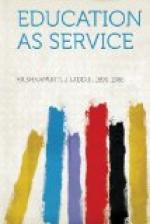6. Confidence. First among the qualifications for the teacher has been placed Love, and it is fitting that this little book should end with another qualification of almost equal importance—Confidence. Unless the teacher has confidence in his power to attain his goal, he will not be able to inspire a similar confidence in his boys, and self-confidence is an indispensable attribute for success in all departments of human activity. The Master has beautifully explained why we have the right to be confident.
“You must trust yourself. You say you know yourself too well? If you feel so, you do not know yourself; you know only the weak outer husk, which has fallen often into the mire. But you—the real you—you are a spark of God’s own fire, and God, Who is almighty, is in you, and because of that there is nothing that you cannot do if you will.”
The teacher must feel that he has the power to teach his boys and to train them for their future work in the world. This power is born of his love for them and his desire to help them, and is drawn from the one spiritual life of which all partake. It is because the teacher and his boys are one in essence, make one little flame in “God’s own fire,” that the teacher has the right to be confident that every effort to help, growing out of his own share in the one life, will reach and stimulate that same life in the boys.
He will not always be able to see at once the effect he is producing. Indeed, the most important influence the teacher has shows itself in the growing characters of the boys. No success in examinations, in reports, in inspections can satisfy the real teacher as to the effect of his work. But when he feels that his own higher nature is strengthened and purified by his eagerness to serve his boys, when he has the joy of watching the divine life in them shining out in answer to that in himself, then his happiness is indeed great. Then he has the peace of knowing that he has awakened in his boys the knowledge of their own divinity, which, sooner or later, will bring them to perfection.
The teacher is justified in feeling confident because the divine life is in him and his boys, and they turn to him for inspiration and strength. Let him but send out to them all that is highest in himself, and he may be quite sure that there will not be one boy who will not to some extent respond in his own higher Self, however little the response may be seen by the teacher.
This constant interplay of the one life between teacher and students will draw them ever nearer to each other. They learn in the school to live together as elder and younger brothers of the one school family. By living a life of brotherhood within the small area of the school, they will be trained to live that life in the larger area of the nation. Then they will gradually learn that there is but one great brotherhood in all the world, one divine life in all. This life each separate member of the brotherhood is trying to express, consciously or unconsciously. The teacher is indeed happy who knows his own divinity; that knowledge of the divinity in man is the highest lesson it will ever be his privilege to teach.




